Sleep Optimisation Gamers: Proven Tips for Quality Rest and Focus
Updated On: October 24, 2025 by Aaron Connolly
The Importance of Sleep for Gamers
Quality sleep shapes reaction times, decision-making, and focus. These three skills really set apart good gamers from the greats.
If you fall into poor sleep habits, your gaming performance can drop by as much as 30%. Burnout risk goes up too, especially for competitive players.
Effects of Sleep on Gaming Performance
When we don’t sleep enough, our reaction times take a nosedive. Just two hours less sleep can slow reactions by 50-100 milliseconds.
In games like CS2 or Valorant, this delay can be the difference between clutching a round or getting knocked out.
Without proper sleep, decision-making gets fuzzy. Our brains process info slower, so strategic thinking suffers—especially in MOBAs like League of Legends where split-second calls make or break team fights.
Focus and concentration drop off after a bad night’s sleep. Lots of gamers say they lose track of minimap info or miss important audio cues when they’re tired.
These little lapses? They add up and hit your performance hard.
We lock in strategies and muscle memory during sleep. So, if you want to actually improve from practice, you need proper rest.
When you skimp on sleep, your improvement slows way down.
Risks of Poor Sleep for Gamers
Gaming fatigue creeps in and becomes chronic if you rack up sleep debt. It’s not just feeling tired—your hand-eye coordination and peripheral vision start to slip.
This creates a nasty loop: you perform worse, so you play longer to “make up for it,” and end up sleeping even less.
Physical health problems pop up if you keep running on empty. Gamers who regularly get less than six hours of sleep risk more eye strain, repetitive injuries, and even weaker immune systems.
Mental health impacts show up too—think more anxiety, irritability, and that familiar tilt or rage-quitting.
Team dynamics suffer when tired players get frustrated or short-tempered.
Burnout rates shoot up when esports athletes skip sleep. Pro teams now watch sleep patterns closely, since exhausted players drop out 40% more often.
Comparing Sleep Needs in Gamers versus Non-Gamers
Gaming puts a bigger strain on your brain than regular screen time. The nonstop decisions and rapid visuals in competitive games mean you really need the full 7-9 hours adults are supposed to get.
Screen exposure hits gamers differently than casual users. Gaming throws more intense blue light at your eyes, and the higher engagement can delay melatonin by up to 90 minutes compared to just watching TV.
Sleep timing becomes a bigger deal for competitive gamers. Tournament schedules and team practice mean you need consistent sleep-wake cycles.
Pro players usually stick to stricter sleep routines than casual gamers to hit peak performance windows.
Recovery sleep needs change depending on how hard you game. Casual players can bounce back with one good night, but competitive gamers might need a couple of nights to fully recover after a tough tournament stretch.
Understanding Circadian Rhythm and the Gamer’s Internal Clock
If you game late into the night, you mess with your body’s natural 24-hour clock. This makes it tough to fall asleep and wake up feeling rested.
Figuring out how your internal clock works can help you game smarter and still keep your sleep on track.
What is the Circadian Rhythm?
Circadian rhythm is your body’s 24-hour timer, telling you when to feel sleepy or alert. It sits in your brain and responds to light and darkness.
This timer controls a bunch of things:
- Sleep-wake cycles—lets you know when to feel tired
- Hormone production—triggers melatonin for sleep
- Body temperature—drops at night to help you rest
- Metabolism—affects digestion and energy
Light is the main thing keeping your internal clock steady. Bright light keeps your brain thinking it’s daytime.
Darkness? That means melatonin kicks in, making you sleepy and ready for actual rest.
Here’s a tip: Our circadian rhythm evolved with the sun. All this artificial light from screens just confuses the system.
Most people start feeling sleepy between 9 and 11pm when melatonin rises. Gamers who push past this window? They’re fighting against ancient biology.
How Late-Night Gaming Disrupts the Internal Clock
Gaming screens blast blue light that tricks your brain into thinking it’s still daytime. Studies show gamers push their bedtime back by an average of 101 minutes on gaming nights.
Blue light can suppress melatonin for up to three hours. So, if you’re gaming at 11pm, you might not fall asleep until 2am or even later.
Late-night gaming causes a few headaches:
- Competitive play keeps your mind buzzing
- Bright screens tell your brain to stay awake
- Irregular sleep times throw off your internal clock
- Less sleep means you’ll perform worse the next day
The thrill from winning (or the frustration from losing) releases stress hormones, and those can take hours to calm down.
Chronic sleep disruption weakens your immune system and slows your reactions. Decision-making takes a hit too.
Some gamers end up with delayed sleep phase disorder, meaning they naturally fall asleep way later than most people.
Restoring Natural Sleep Cycles
You can reset your circadian rhythm without ditching gaming. The trick is to work with your body, not against it.
Start with light management:
- Flip on blue light filters after sunset
- Keep your gaming room dim in the evening
- Get outside for 15-30 minutes of bright light each morning
- Avoid screens for at least an hour before bed
Try timing strategies to rebuild your routine:
| Time | Action | Purpose |
|---|---|---|
| Morning | Bright light exposure | Reset internal clock |
| Evening | Dim lighting while gaming | Cue melatonin production |
| 2 hours before bed | Lower screen brightness | Let yourself get drowsy |
| Same time daily | Go to bed | Lock in your sleep rhythm |
Protect your sleep by setting a gaming curfew about 90 minutes before bed. Use that time to wind down with something less stimulating.
Here’s a quick win: Play earlier in the evening instead of late at night. Afternoon or early evening sessions don’t mess with your melatonin.
Some gamers like to nap strategically. A short 20-30 minute nap before evening sessions can boost your focus without wrecking your night sleep.
Consistency is everything. It usually takes a couple of weeks to build new habits, so hang in there even if it feels weird at first.
Blue Light and Its Impact on Sleep
Blue light from gaming screens messes with your natural sleep cycle by suppressing melatonin. After a long session, it’s just harder to fall asleep.
If you learn how to manage your screen exposure and use protective tools, you can seriously boost your sleep quality.
How Blue Light Affects Melatonin
Blue light sends the wrong message to your brain—it thinks it’s still daytime. When you stare at screens, your pineal gland cuts melatonin production by up to 50%.
Melatonin is what makes you feel sleepy. Studies show blue light before bed can suppress melatonin for twice as long as other light.
This messes with your sleep quality. You’ll take longer to fall asleep, get less REM, and probably wake up groggy.
Gaming just makes it worse. Those late-night sessions mean hours of blue light. Lots of gamers end up lying awake for ages after finishing a session.
Want a quick win? Stop gaming about two hours before you want to sleep. That gives melatonin time to build up.
Best Practices for Managing Screen Time
Pick a cutoff time for gaming. Most sleep experts say to stop using screens 1-2 hours before bed.
Try the 20-20-20 rule during gaming: every 20 minutes, look at something 20 feet away for 20 seconds. It helps with eye strain and lowers blue light intensity.
Switch up your evening games:
- Single-player games with darker visuals
- Strategy games that don’t need fast reactions
- Mobile games with night modes
Start dimming your room lights about half an hour before you’re done gaming. That helps your body start making melatonin.
Heads up: Skip competitive multiplayer games late at night. The stress can keep you awake even if you cut the blue light.
Blue Light Filters and Digital Tools
Most devices now come with blue light filters. Windows has Night Light, macOS has Night Shift, and gaming monitors often have Low Blue Light modes.
Try out some software:
| Tool | Cost | Features |
|---|---|---|
| f.lux | Free | Adjusts colour temperature automatically |
| Iris | £15 | Has gaming presets |
| Windows Night Light | Free | Basic blue light reduction |
Blue light glasses cost anywhere from £10-50 and block 20-90% of blue light. Look for ones that target 400-490nm wavelengths.
Some gaming monitors use Eye Care tech to cut blue light at the hardware level. ASUS, BenQ, and ViewSonic all offer these.
Another quick win: Turn on your device’s night mode and slowly increase the filter strength until it feels right for evening gaming.
Optimising Your Evening Gaming Routine
Building some structure into your evening gaming can really improve your sleep—without killing your fun. If you time intense games right and use good wind-down routines, you’ll get better rest and still enjoy your favourites.
Limiting Intense Gaming Before Bed
High-intensity games get your heart pounding and fill your system with adrenaline. That makes sleep tough.
Shooters, battle royales, and ranked matches especially can leave your mind spinning long after you log off.
Try switching to calmer games at least 90 minutes before you want to sleep. Turn-based strategy, puzzles, or chill sims are perfect for winding down.
Need some late-night game ideas?
- City builders or farming sims
- Puzzle games like Tetris or match-threes
- Casual exploration games
- Card games or chess
If you just can’t skip competitive games late, lower the intensity. Play unranked instead of ranked. It sounds simple, but it really helps you relax and get sleep-ready.
Setting Screen Time Boundaries
Blue light from screens holds back melatonin, the hormone that gets you sleepy. Gaming monitors and TVs can blast out a lot of blue light, especially in bright scenes.
Set a hard gaming cutoff 30-60 minutes before bed. Use phone alarms or time-tracking apps to remind yourself. Lots of gamers swear by the “one more match” rule—when the alarm goes, finish your current game but don’t start another.
Turn on night mode or warm colour settings after 8 PM. Most gaming systems have these now:
- PlayStation 5: Settings > Screen and Video > Video Output
- Xbox Series X/S: Settings > General > TV & Display Options
- PC: Windows Night Light or f.lux
Blue light filtering glasses can help for late sessions. The science is still out, but plenty of gamers say they get less eye strain and better sleep.
Strategies for Winding Down After Gaming
Your brain craves a little downtime after gaming before it can really settle in for sleep. Try giving yourself a 20-30 minute buffer between your last game and bedtime—fill it with calming stuff.
Some solid wind-down ideas:
- Light stretching or a bit of gentle yoga
- Reading a real book or using an e-reader with warm light
- Listening to chill music or a sleep podcast
- Jotting down a few thoughts about your gaming session in a journal
Skip the social media scroll, wild YouTube videos, or hyped-up game talk right after playing. Those things just ramp your brain back up when you’re trying to relax.
Keep your bedroom cool—think 16-19°C—and block out light with blackout curtains. When your room’s dark and at a steady temp, your body starts getting the hint: time for real sleep.
Establishing a Consistent Sleep Schedule
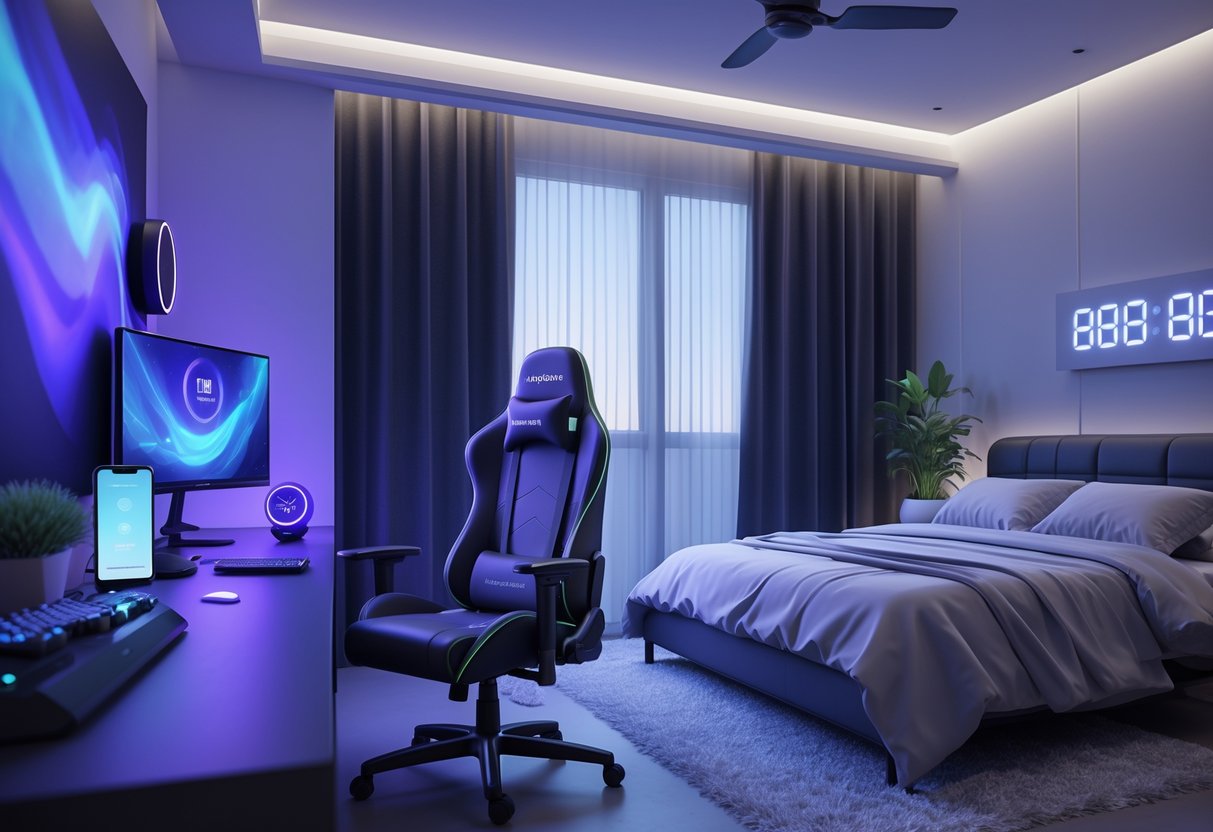
Your internal clock honestly works best when you stick to a routine. Gamers who keep regular sleep times usually get better rest and see a real boost in gaming performance.
The trick is to pick a bedtime you can actually stick to, use reminders, and keep it steady—even on weekends.
Setting Regular Sleep and Wake Times
We really do need to work with our bodies, not fight them. Pick a bedtime that gives you 7-9 hours before you need to be up.
Start with your wake-up time. Say you need to be up by 10 AM for work or uni. Count backwards—if you want 8 hours of sleep and usually take 30 minutes to fall asleep, shoot for a 10 PM bedtime.
Lots of gamers try to overhaul their schedule overnight, but going from 3 AM to 10 PM instantly? That’s just setting yourself up for frustration.
Make smaller changes:
- Move your bedtime 15-30 minutes earlier each night
- Adjust your wake-up time in small steps too
- Give yourself a week or two to get used to it
Your body clock won’t reset instantly. If you rush it, you’ll probably just end up staring at the ceiling or falling back into old habits.
Notice how you feel after different amounts of sleep. Some people run fine on 7 hours, but others need the full 9 to feel sharp.
Using Alarms and Reminders
Alarms and reminders can keep you on track so you don’t have to rely on pure willpower. Try setting up a few reminders throughout your evening.
Set a gaming cut-off alarm about 2 hours before you want to sleep. That gives your brain time to shift gears.
Try this bedtime reminder routine:
- 2 hours before: Stop competitive gaming
- 1 hour before: Start winding down (maybe just casual games)
- 30 minutes before: No screens, start your sleep prep
Switch your phone to “Do Not Disturb” during this time. Notifications and Discord pings can totally wreck your sleep plans.
Morning alarms work best if you:
- Put them across the room (so you have to get up)
- Use one that gets louder gradually
- Pair it with bright light from your window or lamp
Sunrise alarm clocks are awesome for this—they brighten the room slowly, so waking up feels way less brutal.
Some gamers even get friends involved. If you tell your gaming buddies your sleep goals, they can help remind you to log off.
Handling Weekend and Holiday Routines
Letting your sleep schedule slide on weekends can wipe out all your weekday progress. Even small changes can make Mondays rough.
“Social jet lag” is real for gamers. Staying up until 4 AM on Saturday and sleeping until noon? That messes with your rhythm, just like flying to another time zone.
Try to keep weekend sleep-ins to just an hour past your usual wake-up. If you get up at 8 AM during the week, don’t sleep past 9 AM on weekends.
For holiday gaming marathons:
- Decide ahead of time which nights you’ll stay up late
- Plan recovery days with earlier bedtimes
- Stick to your wake-up time, even after a late-night session
Quick weekend tips:
- Keep your bedtime routine the same, even if it’s a bit later
- Use blackout curtains if you’re sleeping in after sunrise
- Don’t try to “catch up” on sleep with marathon 12-hour snoozes
Bank holidays and tournaments can tempt you to throw your schedule out the window. Treat these like shift work—gradually adjust before and after the event.
Investing in a steady sleep schedule pays off in-game. Better sleep means faster reactions, sharper decisions, and more focus when it counts.
The Role of Natural Light for Gamers
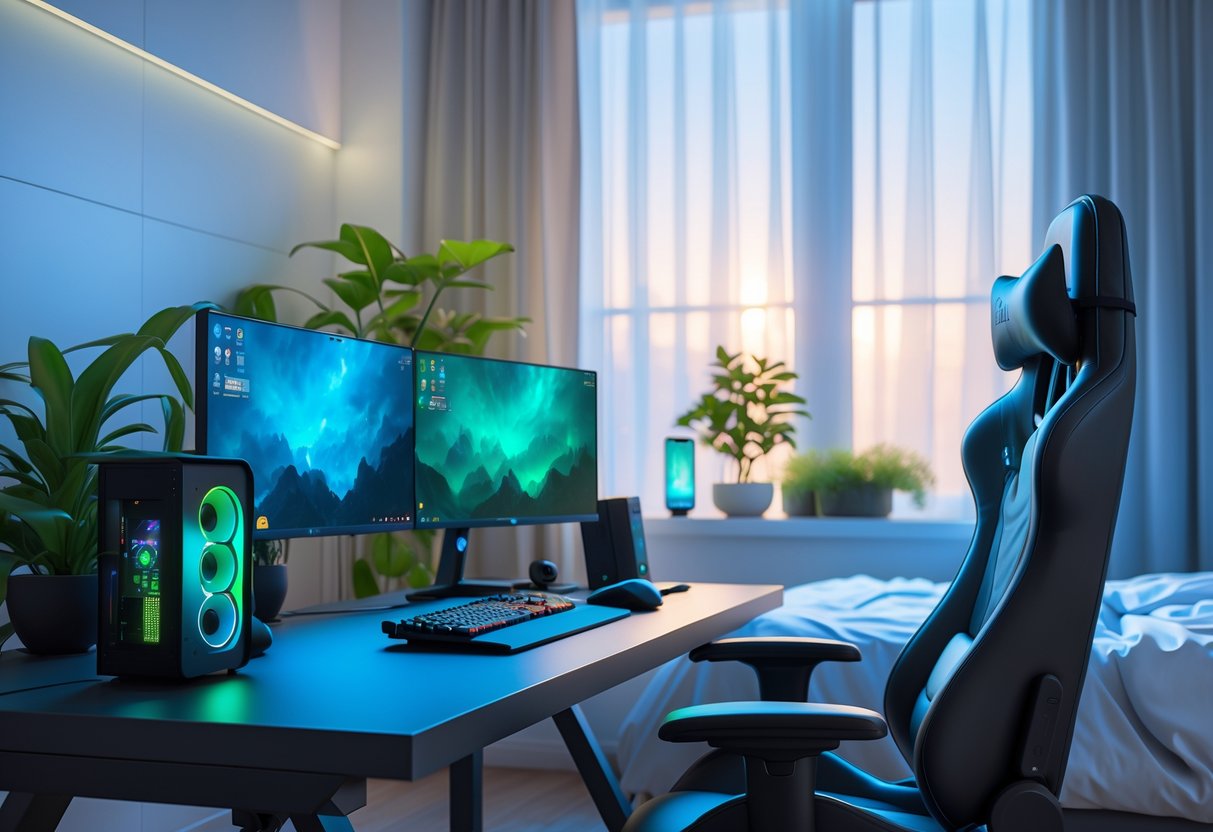
Natural light totally runs the show when it comes to your internal clock. Getting sunlight at the right times—and keeping it dark when you should—helps your sleep big time.
Morning Sunlight Exposure
Getting outside in the morning is honestly one of the best things you can do for your sleep. Your body needs that bright light to know it’s time to be awake.
Here’s what works:
- Bright day? 10-30 minutes outdoors
- Cloudy day? 20-60 minutes outside
- Within 2 hours of waking up is ideal
No need to stare at the sun—just being outside or near a sunny window does the trick.
If you can’t get outside, grab a spot by a big window or use a light therapy box. These are a decent substitute when sunlight’s in short supply.
Let the light hit your eyes directly—don’t wear sunglasses in the morning if you’re trying to reset your body clock.
Avoiding Artificial Light at Night
Bright lights from 10 PM to 4 AM just confuse your body. Gaming screens pump out blue light that keeps you awake by blocking melatonin.
Try these tricks:
- Dim your lights after 10 PM
- Wear blue light blocking glasses while gaming
- Install f.lux or similar apps on your PC
- Keep room lighting low, but safe
Even just two hours of blue light in the evening can mess with your sleep hormones. No wonder it’s tough to wind down after a late session.
Candlelight and moonlight don’t mess with your sleep signals, so they’re fine at night.
LED strips behind your monitor are better than bright overhead lights—they keep things visible without blasting your eyes.
Gaming Environment and Bedroom Hygiene
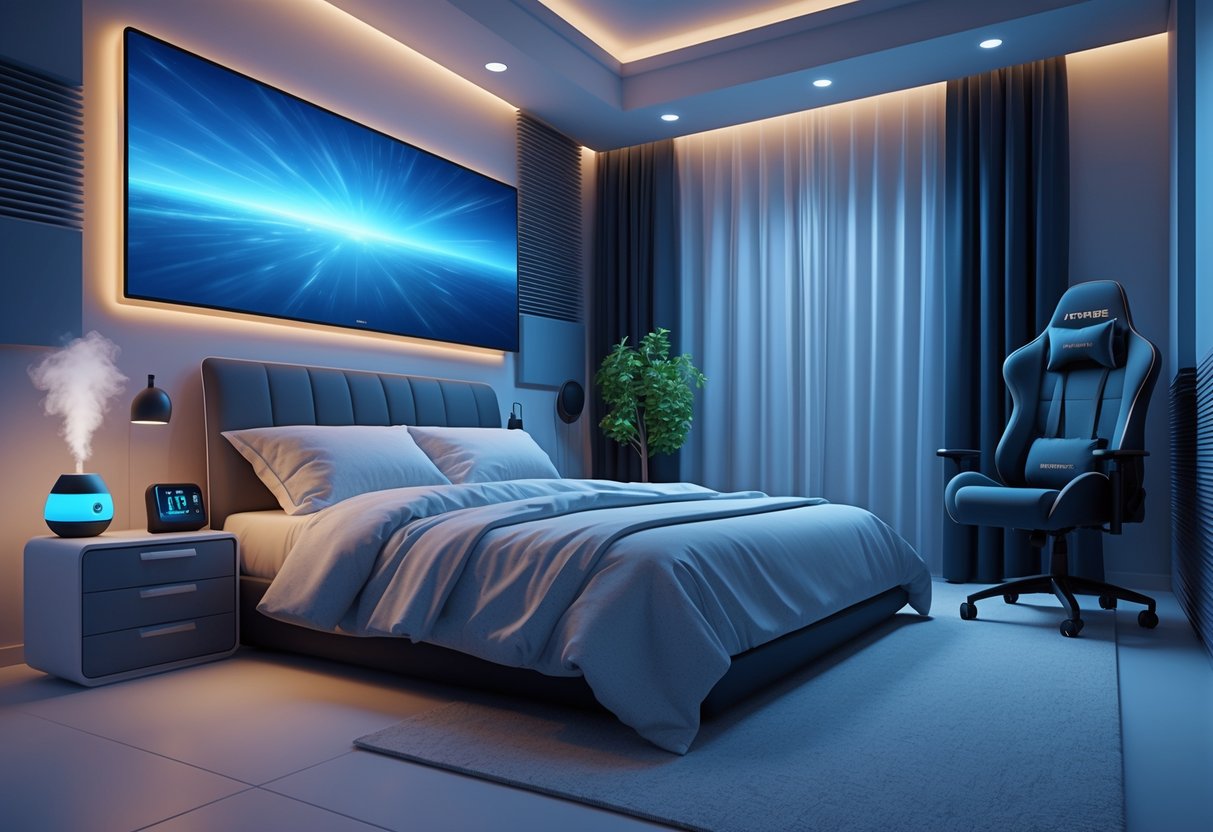
Your gaming setup and sleep area make a huge difference in how well you rest after gaming. Setting boundaries, controlling the room, and cutting down on interruptions help you get real sleep.
Separating Gaming and Sleep Spaces
Try to keep your gaming station away from your bed. That little bit of distance helps your brain switch from game mode to sleep mode.
Ideally, the bedroom is gaming-free. If you can, move your setup to another room. If not, use a curtain or divider to create some separation.
When you game where you sleep, your brain starts linking the bedroom with excitement. Not great for winding down.
If space is tight:
- Turn your monitors away from the bed
- Drape a cloth over your gear after gaming
- Use one kind of lighting for gaming, another for bedtime
Even just turning your chair away from the bed can help signal “game time is over.”
Optimising Room Temperature and Darkness
Sleep gets way better when you manage the room’s temp and light. Aim for 16-19°C (60-67°F) in your bedroom.
Gaming heats things up—all that gear and activity adds warmth. Switch everything off at least an hour before bed so the room can cool down.
Blackout curtains or blinds block outside light. Gaming gear often keeps glowing even after you’re done, so don’t forget about all those little LEDs.
For total darkness:
- Cover or unplug LED peripherals
- Use blackout curtains or an eye mask
- Unplug chargers with bright lights
- Put your mouse and keyboard in sleep mode
Even tiny lights can mess with your sleep cycle, making it harder to get good rest.
Reducing Sleep Interruptions
Gaming notifications and random sounds can snap you out of sleep. Shut down all gaming alerts before bed to avoid getting woken up.
Turn off Discord, Steam, and launcher notifications during your sleep hours. Friends in other time zones can ping you at the worst times.
Headsets left plugged in sometimes play sounds from background apps. Make sure you close all gaming software and unplug audio gear before bed.
Interruptions to cut out:
- Steam friend messages
- Game update popups
- Streaming alerts
- RGB lights on your mouse
- PC cooling fans running overnight
Set “Do Not Disturb” on every gaming platform you use. That way, late-night alerts don’t break up your sleep.
Healthy Snacks and Caffeine Management
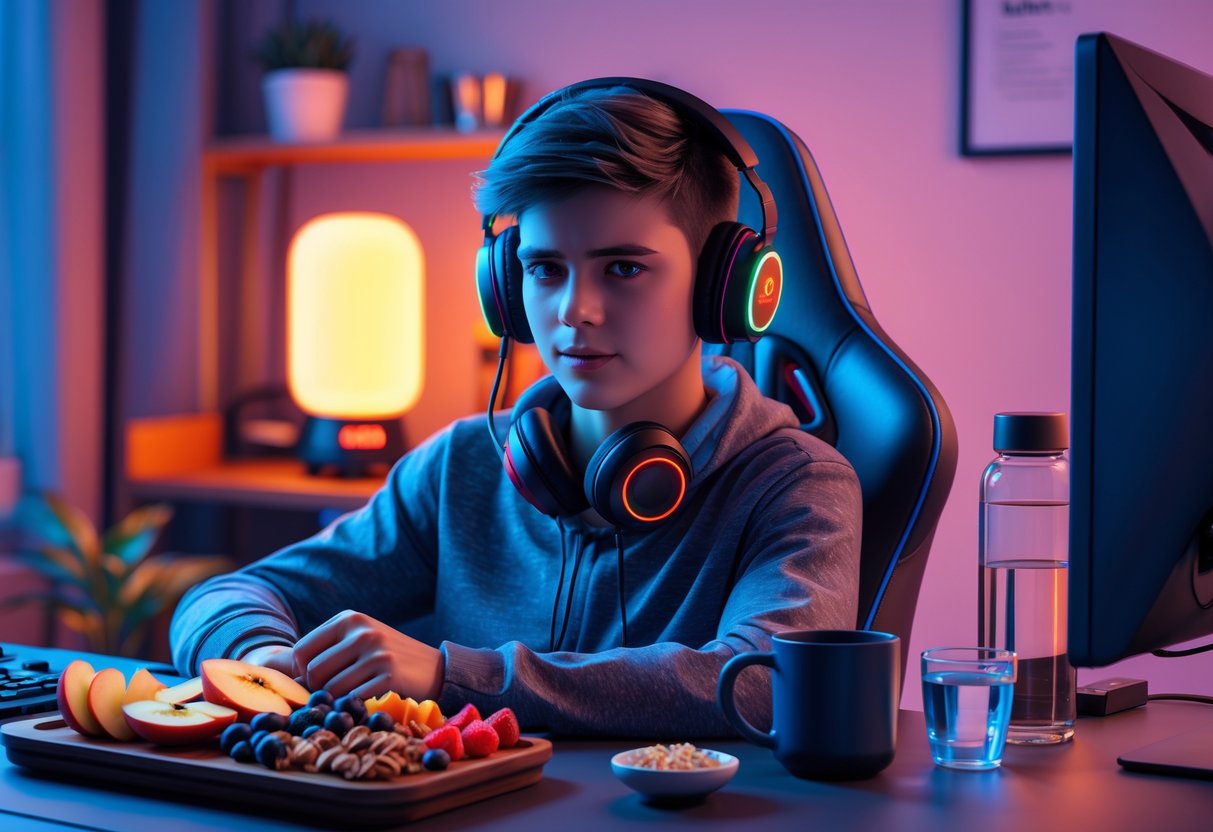
What you eat and drink while gaming actually affects your sleep and energy levels. Smarter snack choices can keep you focused without that sugar crash or caffeine overload.
Best Snacks for Evening Gaming
Late-night gaming calls for snacks that don’t spike your blood sugar or mess with your sleep. Go for balanced picks with protein, healthy fats, and fiber.
Top evening snacks:
- Mixed nuts and seeds (almonds, walnuts, pumpkin seeds)
- Greek yoghurt with berries
- Apple slices and almond butter
- Hummus with carrot or cucumber sticks
- Hard-boiled eggs
These help keep your blood sugar steady, so you’re less likely to crash or reach for more snacks late at night.
Pro tip: Prep your snacks before you start gaming. It keeps you from mindlessly munching and saves your gear from greasy hands.
Skip crisps, sweets, and energy bars after 6 PM. They’ll spike your blood sugar and can mess with your sleep hours later.
Hydration and Beverage Choices
Staying hydrated keeps your brain sharp and helps you avoid leaning on caffeine. Water should be your go-to during evening sessions.
Good drink options:
- Plain water (aim for about 250ml an hour)
- Herbal teas like chamomile or peppermint
- Diluted juice (1 part juice, 2 parts water)
- Coconut water for a little extra
Keep a big water bottle at your desk. Sometimes, you think you’re hungry, but you’re actually just thirsty.
Heads up: Sports and energy drinks are loaded with sugar and caffeine. They can keep you up way longer than you’d like.
Room temp water is easier to sip throughout the night. Cold drinks can bug your stomach if you’re gaming for hours.
Limiting Caffeine and Energy Drinks
Caffeine blocks your brain’s sleep signals, so it’s best to lay off well before bed. Try to avoid caffeine 8-10 hours before you plan to sleep.
Caffeine cut-off tips:
- If you sleep at 11 PM, stop caffeine by 1-3 PM
- Morning coffee is fine (just have it before 10 AM)
- Green tea still counts as caffeine, even if it’s less
- Energy drinks can pack 80-300mg of caffeine per can
About 80% of gamers snack or drink while playing, and 21% in North America go for energy drinks regularly.
Instead of caffeine, try this:
- Take a 10-minute movement break every hour
- Keep the lights bright while gaming (then dim them after)
- Drink water
- Eat protein-rich snacks for steady energy
Energy drinks can trap you in a cycle—poor sleep leads to more caffeine the next day. Breaking out takes a few days, but your sleep and game skills will thank you.
Relaxation Techniques to Aid Restful Sleep
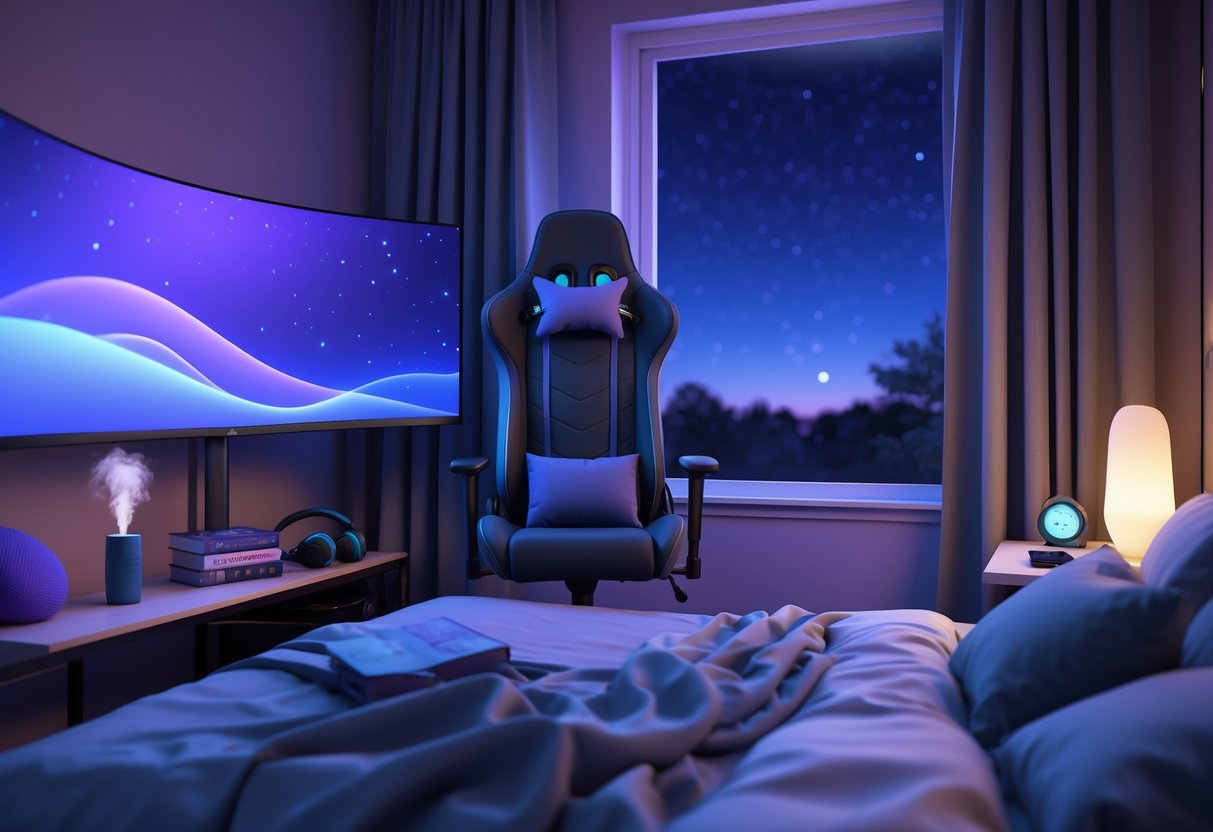
Getting good sleep as a gamer takes more than just shutting down your console. You need some solid relaxation techniques to help your mind shift from that high-energy gaming buzz to a calmer state.
Mindfulness and Meditation Apps
Meditation apps can really help you wind down after a tough gaming session. Headspace and Calm both offer sleep-focused features like bedtime stories and sleep sounds that are actually tailored to help you rest.
A lot of gamers swear by guided meditation because it gives their busy minds something to latch onto. Most apps have sessions ranging from just 3 minutes up to half an hour.
Popular options:
- Headspace: Sleep stories and wind-down exercises
- Calm: Nature sounds and breathing programs
- Insight Timer: Free meditations with built-in timers
Start with a quick 5-minute session and see how you feel, then build up from there. Since most apps offer free trials, you can just test a few and find what clicks.
The biggest win for gamers is learning to pull your mind away from game strategies. It’s a skill that really helps you get proper rest after those intense matches.
Breathing and Stretching Exercises
Simple breathing techniques can knock down the tension that builds up during long hours of gaming. The 4-7-8 breathing method is a favorite: inhale for 4, hold for 7, exhale for 8.
Gaming tightens up your shoulders, neck, and wrists. Basic stretches here can tell your body it’s time to relax.
Pre-sleep stretches:
- Neck rolls (5 each direction)
- Shoulder blade squeezes (10 reps)
- Wrist flexor stretches (30 seconds each)
Gentle yoga poses, like child’s pose or legs-up-the-wall, work great too. No fancy gear needed—just 10 or 15 minutes.
Mixing controlled breathing with gentle movement slows your heart rate and drops your stress hormones. It’s a pretty natural way to ease into sleep.
Non-Sleep Deep Rest Protocols
Non-Sleep Deep Rest (NSDR) protocols give gamers a science-backed way to recharge, even without traditional sleep. These audio guides help reset your nervous system after a wild gaming session.
NSDR activates your parasympathetic nervous system, which brings on that chill state you need to sleep well. Some gamers use these when they wake up in the night and just can’t get back to sleep.
How to try NSDR:
- Search “NSDR” on YouTube—there are loads of free options
- Pick sessions from 10 to 30 minutes
- Try different voices and styles until you find one that works
- Use it if you can’t fall back asleep
Yoga Nidra is another option, using guided body awareness to get similar results. Both teach your mind to relax on command.
If you make these a habit, they get even more effective. Honestly, it’s worth adding to your routine even if you’re sleeping fine—it helps with stress and mental health too.
Daytime Habits That Improve Night-Time Sleep
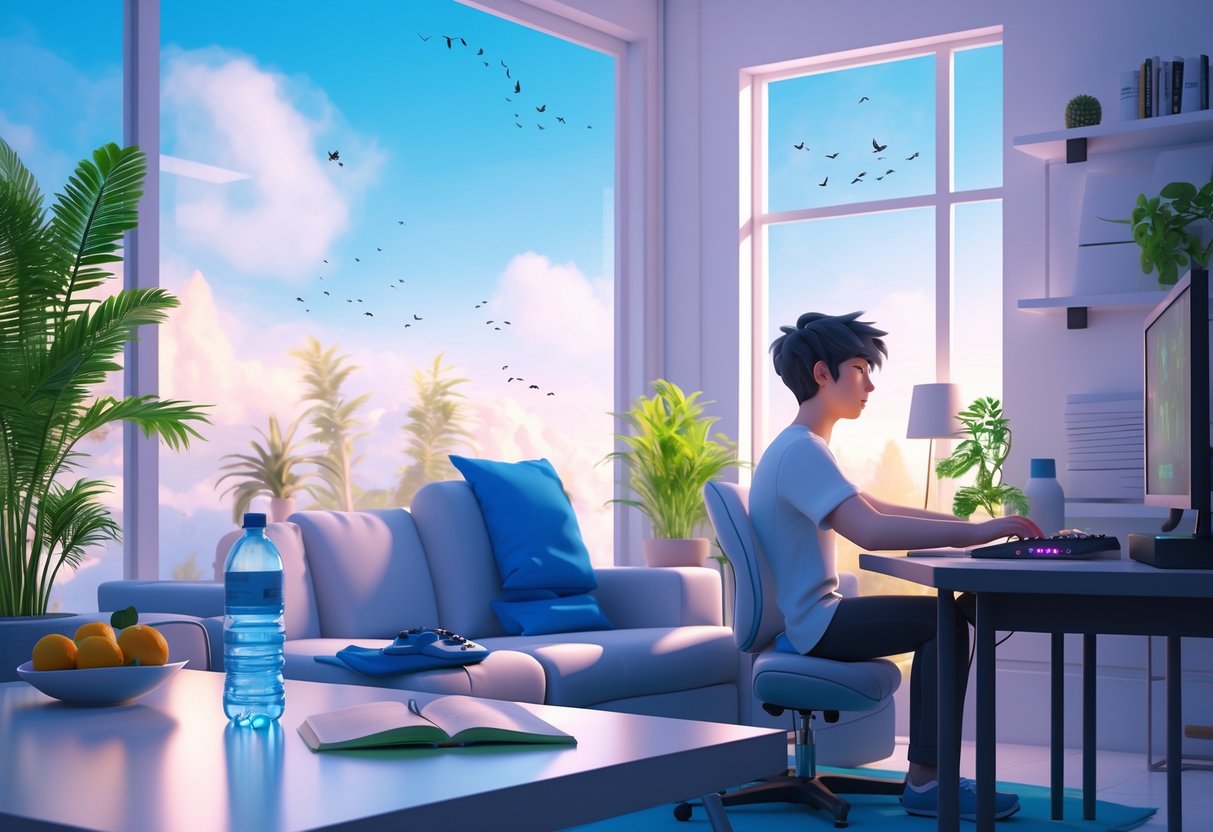
Your daily habits play a huge role in how well you sleep. For gamers who spend hours in front of screens, getting enough physical activity and managing screen time during the day can seriously boost your energy and help you sleep better.
Physical Activity for Better Rest
Regular exercise is a game-changer for fighting gaming fatigue and improving sleep. Moving your body helps set your sleep-wake cycle and melts away mental tension from all that gaming.
Shoot for at least 30 minutes of moderate activity a day. You don’t have to hit the gym—just a brisk walk around the block can do wonders. Timing matters, though.
Best times to exercise:
- Morning (7-10am): Kickstarts your energy and sets your rhythm
- Afternoon (2-5pm): Breaks up marathon gaming sessions
- Early evening (6-7pm): Last chance before winding down
Skip intense workouts right before bed. Your body needs a few hours to cool off. Light stretching or yoga in the evening is actually perfect for winding down.
Gaming coach James Connolly says his clients who take regular walks between practice sessions feel less wiped out during late-night matches. Better circulation really helps you stay sharp.
Balancing Screen Time Throughout the Day
Managing your screen time during the day makes a big difference for sleep later. Too many gamers stay inside all day and then wonder why they’re wired at night.
Morning light is super important. Try to get outside for 10-30 minutes within an hour of waking up. If it’s cloudy, aim for 20-60 minutes. That sunlight tells your body when to be awake and when to wind down.
Screen break tips:
- Use the 20-20-20 rule: every 20 minutes, look at something 20 feet away for 20 seconds
- Take a 5-minute outdoor break every hour if you’re gaming for a while
- Use natural light for stuff like eating or reading
Don’t wear sunglasses on these quick breaks unless you absolutely have to. Your eyes need that real light to set your internal clock.
Pro tip: Open your curtains and sit near a window during morning gaming. Even that passive sunlight helps keep your sleep cycle on track.
The Link Between Sleep, Mental Health, and Gaming
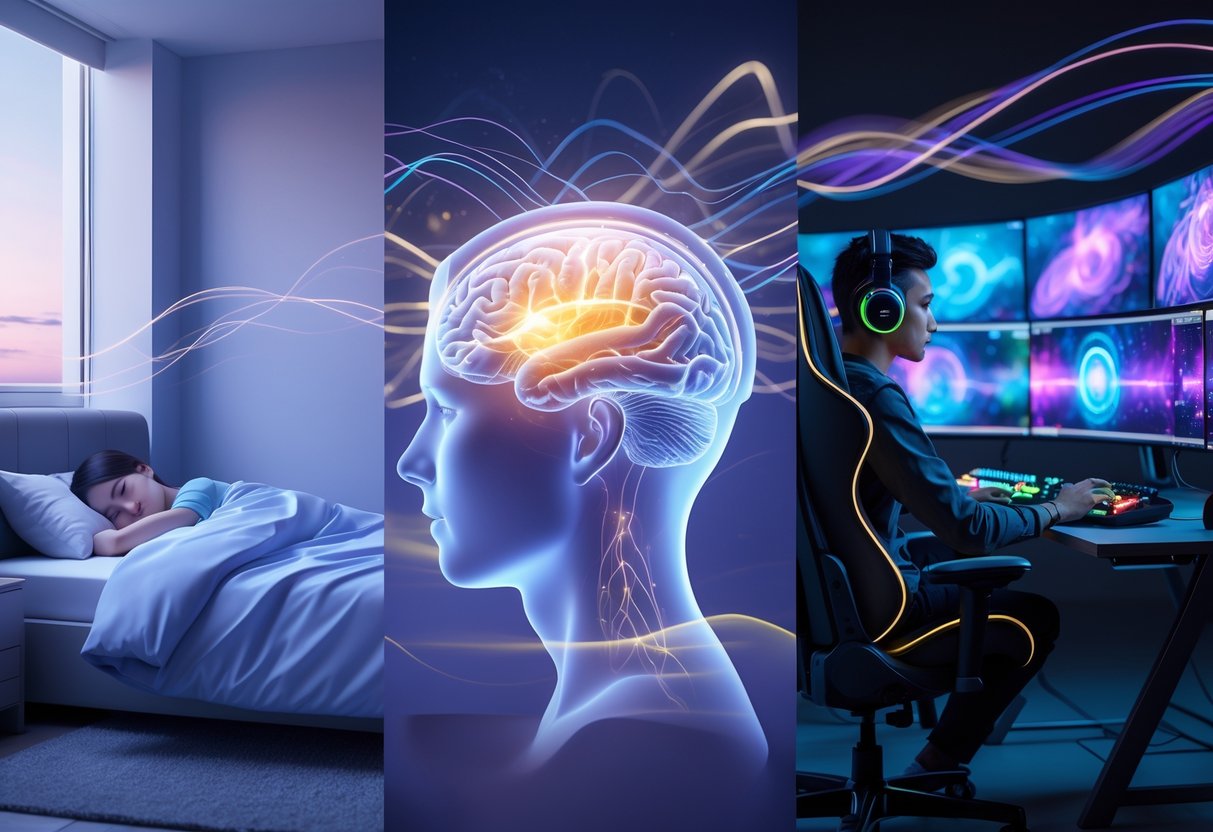
Bad sleep creates this annoying cycle—poor rest leads to more stress, less focus, and then even more gaming to cope. The more intense your gaming, the more your sleep can suffer, and mental health plays a big role in breaking that loop.
Managing Stress and Burnout
Gaming stress can keep you up at night by raising cortisol and making your mind race. Competitive matches push your heart rate and adrenaline up, so it’s tough to chill out when you should be winding down.
Big stress triggers:
- Losing streaks in ranked games
- Team drama during matches
- The pressure before tournaments
- Worrying about gaming expenses
Burnout creeps in when you push through tiredness instead of taking breaks. Your brain needs downtime to process and reset.
Quick stress fixes:
- Limit gaming sessions to 2-3 hours max
- Try a quick breathing exercise between matches
- Give yourself a 30-minute break before bed
- Track your mood and patterns in a gaming journal
Studies show that mental health support really helps with sleep quality. Gamers who handle stress well usually sleep better and focus more during games.
Signs of Sleep Deprivation in Gamers
Most sleep-deprived gamers don’t even realize it—they just chalk it up to a bad day. But missing sleep really messes with your game and daily life.
Physical signs:
- Slower reaction times
- Headaches or eye strain
- More hunger and snacking
- Feeling tired even after a long sleep
Cognitive signs:
- Trouble concentrating in matches
- Bad decisions during strategy games
- Forgetting game mechanics
- Getting annoyed with teammates
Playing more than six hours a day almost always wrecks your sleep. Some gamers stay up late trying to “fix” bad performance, but that just keeps the cycle going.
Sleep debt red flags:
- Relying on caffeine just to feel normal
- Nodding off during non-gaming stuff
- Microsleeps in long gaming sessions
- Sleeping way past noon on weekends
James Connolly, a gaming expert, says, “A lot of gamers don’t see that their ‘slump’ comes right after a week of bad sleep.”
Frequently Asked Questions
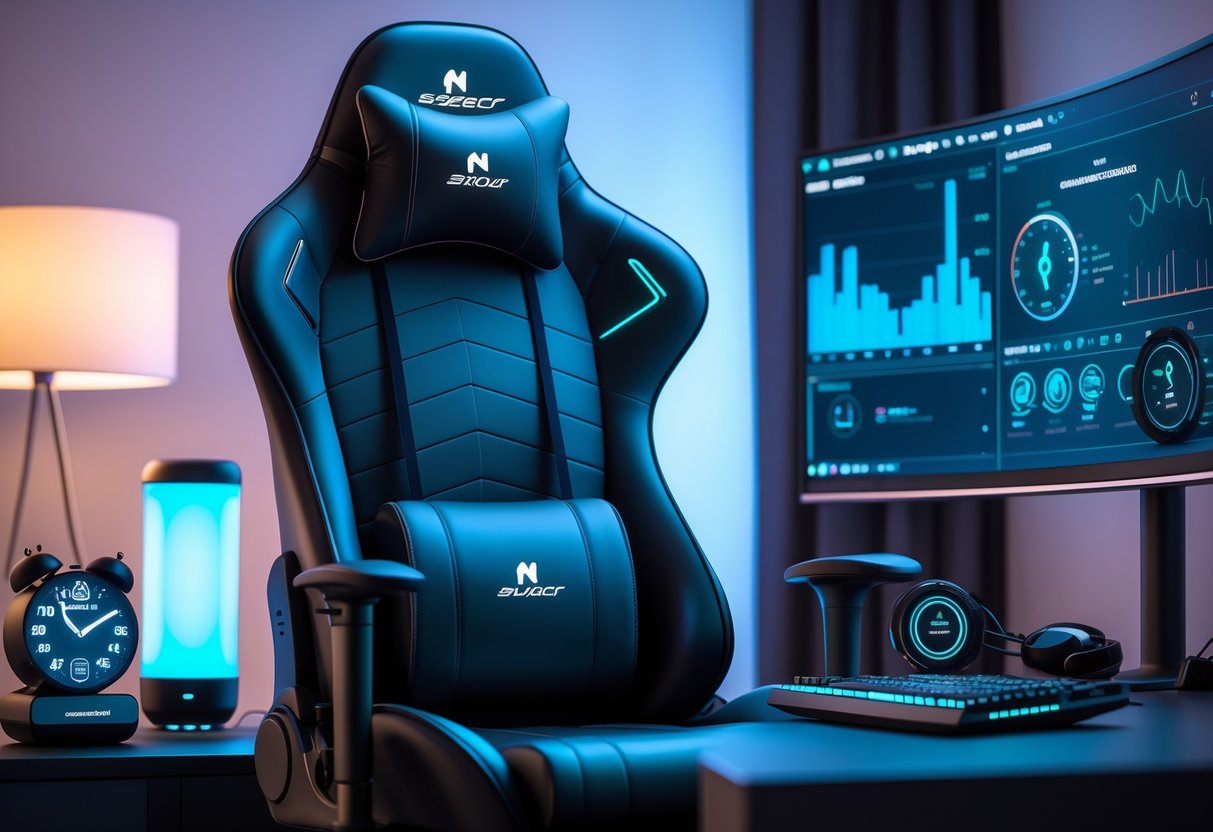
Gaming can mess with your sleep in a bunch of ways: blue light, raised stress hormones, and a disrupted sleep schedule. All this can make it tough to fall asleep, lower your sleep quality, and throw off your bedtime routine.
What impact does playing video games have on sleep quality?
Video games can seriously mess with your sleep quality. The blue light from screens stops your body from making melatonin, so you just don’t feel sleepy.
Gaming also pumps up your cortisol and adrenaline. Those stress hormones keep your brain buzzing long after you’ve put the controller down.
Competitive sessions get your mind going, and it keeps spinning on game scenarios even when you’re trying to sleep.
Studies have found that gamers often hit lighter sleep phases and wake up more during the night. So you might spend enough time in bed but still wake up groggy.
Could playing video games lead to sleep disturbances?
Absolutely—gaming can cause all sorts of sleep issues. The most common is just lying awake, unable to drift off even when you’re tired.
Late-night gaming messes with your body’s clock. The more you game at night, the later you want to sleep.
A lot of gamers get stuck with a racing mind after a tough session. You keep replaying moves, thinking about what you could’ve done better, or stressing about the next match.
Gaming can also break up your sleep, so you wake up a lot and never get deep rest.
How much time should one allow between gaming and bedtime to ensure a good night’s sleep?
Try to stop gaming at least 2-3 hours before you want to fall asleep. This gives your stress hormones time to settle down.
Your brain needs a break from all that stimulation. If your session was really intense, you might need even longer.
If you have to game close to bedtime, keep it short—1-2 hours max—and stick to chill, non-competitive games.
Everyone’s different, though. Some folks need 4 hours to wind down, while others are fine with just 1 or 2.
What are the potential consequences of playing video games into the late hours?
Late-night gaming can totally wreck your sleep schedule and leave you running on empty. Your reaction time, focus, and overall game get worse.
Poor sleep weakens your immune system, so you’ll probably get sick more often. You’ll also recover slower from any physical activity.
Even one bad night of sleep can make you foggy. You’ll notice your memory, focus, and thinking speed take a hit.
Your gaming skills suffer too—slower reactions, worse strategy, and more mistakes in big moments.
Why might someone find it difficult to fall asleep after a gaming session?
Gaming ramps up your heart rate and blood pressure, so your body stays hyped up. It takes a while for everything to calm down.
Bright screens block melatonin for 2-3 hours. Without it, you just don’t get sleepy.
Competitive games trigger your fight-or-flight response. Your body is literally wired to stay alert.
Your brain keeps replaying gaming moments through “cognitive arousal”. You can’t stop thinking about strategies, mistakes, or what’s coming next.
Is there a connection between engaging in video games before sleep and the content of dreams?
Gaming before sleep can really shape what you dream about, and even how intense those dreams get. Plenty of gamers say they end up dreaming about the same characters, scenarios, or even the weird rules from the games they played right before bed.
Your brain works on recent memories while you sleep. If you played something vivid or emotional, chances are, pieces of that will sneak into your dreams.
Action-packed or violent games? Those seem to ramp up the odds of having intense or even unsettling dreams. Sometimes, they can even mess with your sleep, making you toss and turn or wake up a lot during the night.
A lot of gamers notice something called “game transfer phenomena.” Basically, game elements pop up in their thoughts and dreams, almost like the game is following them. Puzzle games and ones with lots of repetition seem to do this the most.

